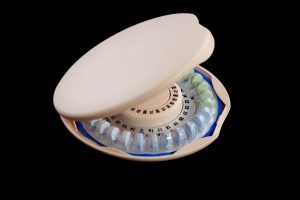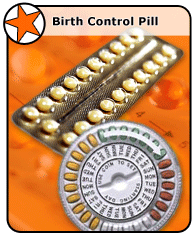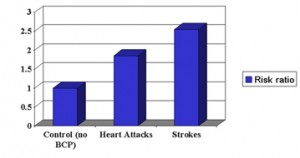Dr. Jolene Brighten gave a lecture about side effects of the birth control pill. This was at the 27th Annual World Congress on Anti-Aging Medicine in Las Vegas from Dec. 13 to 15th, 2019. Her exact title was “Your Body on Birth Control- What Prescribers Should Know About the Effects of Birth Control on the Female Body”.
Most commonly the oral contraceptive pill is prescribed to prevent pregnancy. But the long-acting reversible contraceptives like the IUD and progestin implants are also popular. Depot Provera, the ring and the patch are the least popular ones.
Why women use the birth control pill
Women age 15 to 49 are often on some form of birth control method. 58% of women who use the birth control pill use it for reasons other than to prevent pregnancy. They use it to control symptoms of various conditions.
- 31% use it for menstrual cramps
- 28% want to regulate their periods
- 14% hope to improve their acne
- 4% use the pill for menstrual pains associated with endometriosis
- 11% for other reasons
What the birth control pill does
The birth control pill exerts a negative influence on the hypothalamus and the pituitary gland. This is called “functional hypothalamic amenorrhea”. The birth control pill is not suitable to treat polycystic ovarian syndrome. Symptoms of bleeding may improve for 3 months, but after that the original symptoms return. Thyroid disease that may be present needs separate investigations.
The hormones that are part of the birth control pill are synthetic hormones. They do not quite fit the body’s hormone receptors. For instance, the progestins, artificial analogues of progesterone behave like estrogens, not progesterone. This causes clotting problems cancers of the uterus, breasts and cervix. It can also cause heart attacks and strokes.
List of side effects of the birth control pill
From depression to liver health
The list of side effects of the birth control pill (BCP) is long. The BCP can worsen symptoms of depression and anxiety. The deeper the depression is, the higher is the risk for suicide. There is increased risk of hair loss. The BCP depletes nutrients in the body that the thyroid gland needs to produce thyroid hormones. This can result in hypothyroidism.
It also increases thyroid binding globulin, a protein in the blood that binds thyroid hormones. As a result, there are fewer thyroid hormones available to the body cells. Breasts may become tender and enlarged after the start of the BCP. In some women with fibrocystic disease of the breasts the BCP may improve her cyclical breast changes. The BCP changes the liver both structurally and genetically. As a result, there is a higher risk of developing benign liver tumors and liver cancer.
From gallstones to blood clots
Women with a history of gallstones may experience faster gallstone formation on the BCP. The pill also can elevate your blood pressure. You should have blood pressure checks from time to time to prevent a stroke. Weight gain is common on the BCP. However, some women experience weight loss. Usually the BCP is 99% effective for the prevention of pregnancy. Pain from heavy periods or menstrual cramps are often relieved by the BCP. There is an increased risk to develop diabetes, because insulin resistance is gets worse in patients on the BCP. In postmenopausal women on HRT there is an even higher risk of developing diabetes. Blot clots are a common side effect of the BCP. Being a smoker, having a heart or liver condition, a history of genetic risk of blood clots, having migraines with an aura or being overweight are all additional risk factors for developing blood clots.
From effects on the brain to cancer risks
The BCP can change brain function and structure. This may lead to a different mate selection and production of neurotoxins. Some women get relief from hormonal headaches; but others experience exacerbations of migraines and headaches. In some women acne improves on the BCP; in others acne gets worse. When it comes to stress, some women experience an altered hypothalamic-pituitary-adrenal gland response from the BCP. The BCP reduces some cancer risks, like the risk of ovarian, uterine and colorectal cancer. But the risk for breast cancer, brain cancer and liver cancer are higher. The BCP increases gut permeability, leads to leaky gut syndrome and the disruption of the microbiome. There is often overgrowth of yeast in the gut. In addition, people with a genetic predisposition for autoimmune disease of the gut can develop immune diseases. Multiple studies have shown malabsorption of vitamins, minerals and antioxidants when on the BCP.
From vaginal yeast infections to osteoporosis and autoimmune diseases
Many women develop vaginal yeast infections. Women on the BCP often complain about low or a lack of libido. There can be vaginal dryness and pain with sex.
Teenage women on the BCP often develop decreased bone density. Synthetic hormones lack the specificity to the natural hormone receptors, which leads to decreased bone density. On the other hand, bioidentical estrogen and bioidentical progesterone will indeed build up bone mass. In the past it was thought that hormones would be good for the bones and this is still true with the use of bioidentical hormones.
A number of autoimmune diseases have been identified to be directly related to the use of the BCP. These are Crohn’s disease, multiple sclerosis, lupus, interstitial cystitis and ulcerative colitis.
Synthetic hormones will always have side effects
The body is a complex organism with various hormone receptors built into its cells. In order to be able to cash in on patented modified hormones Big Pharma introduced progestins to replace natural progesterone and various synthetic estrogen products to replace natural estradiol. However, the Women’s Health Initiative has shown in 2002 that these artificial hormones produced heart attacks, strokes, blood clots, colorectal and endometrial cancer and hip fractures. There was an increase of mortality of 15% over 5.2 years compared to controls who did not take artificial hormones within the same timeframe.
Bioidentical hormones have a perfect fit to the natural hormone receptors
In contrast, when bioidentical hormones are given in menopause, there is a 10 to 15 year extension of life expectancy and researchers did not see any of the above mentioned side effects that were noted with synthetic hormones. Many people in Europe have elected to stick to bioidentical hormones for decades; they did not use the synthetic hormones. As a result, there are good data going back to the 1960’s about the safety of bioidentical hormones. In this study several thousand postmenopausal women were followed for 9 years or more and showed no increase in the rate of heart attacks or any cancer. Their postmenopausal symptoms were optimally controlled. I conclude from this that bioidentical hormone replacement in menopause will protect the women from missing hormones safely. There are no side effects and for this reason the bioidentical hormone replacement should become the standard of care.
Conclusion
Synthetic hormones have a long list of devastating side effects. Yet, Big Pharma managed to influence general practitioners and gynecologist to prescribe them to postmenopausal women. The Women’s Health Initiative has changed everything. The promise was that synthetic hormones would show heart-protective effects, cancer protective effects and healing effects for osteoporosis. These have been empty promises! None of this occurred with synthetic hormones- to the contrary! Many physicians are now prescribing bioidentical hormone replacement for women in menopause.
No good alternative for teenage girls
However, for teenage girls there is no good alternative for the traditional birth control pill, even though the catalogue of side effects is of serious concern. One compromise is to limit prescribing the birth control pill for up to 5 years only and then switch to several years of a copper T or other intrauterine device (IUD). Suicide in teenage girls on the BCP is of real concern. Despite the list of side effects many doctors continue to prescribe synthetic hormones for decades to the same patients, who trust that it will benefit them. In time patients will know about the side effects, and unfortunately many will experience them. As a result, it is only a matter of time, till this will be exposed as malpractice!











